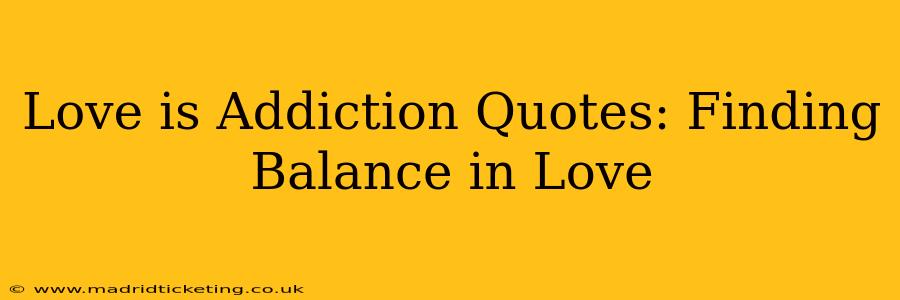Love. That exhilarating rush, the butterflies in your stomach, the feeling of complete and utter devotion. It's a powerful emotion, capable of bringing immense joy and fulfillment. But what happens when that powerful emotion starts to feel… consuming? When the lines between passionate love and unhealthy obsession blur? This exploration delves into the common comparison of love and addiction, examining the relatable "love is addiction" quotes that resonate with many, and offering guidance on finding a healthy balance in romantic relationships.
Many people have voiced the intense feelings associated with love using the metaphor of addiction. The highs, the lows, the desperate need for connection—all echo the cyclical nature of substance abuse. But while the feeling might feel similar, it's crucial to understand the crucial differences and how to navigate love without letting it consume you.
Is Love an Addiction? Understanding the Comparison
The comparison of love to addiction is often fueled by the intense cravings, obsessive thoughts, and withdrawal symptoms that can accompany a passionate relationship, especially in its early stages. When you're deeply in love, you might experience:
- Intense Craving: A constant yearning for your partner's presence, attention, and affection.
- Obsessive Thinking: Your thoughts frequently revolve around your partner, even when you're busy with other things.
- Withdrawal Symptoms: Feeling anxious, irritable, or depressed when separated from your partner, even for short periods.
- Tolerance: Needing increasingly more attention and affection from your partner to feel satisfied.
- Neglect of Other Responsibilities: Prioritizing your relationship to the detriment of your work, friendships, family, or self-care.
These experiences are certainly relatable, but they don't automatically equate to addiction. The key difference lies in the control and harm. Addictive behaviors are characterized by a loss of control, leading to significant harm to oneself and others. While unhealthy relationships can certainly be harmful, passionate love, when properly managed, can be a source of immense strength and happiness.
"People Also Ask" – Addressing Common Concerns
Here we address some of the frequently asked questions surrounding the topic of love and addiction:
How do I know if my love is unhealthy or obsessive?
A healthy relationship involves mutual respect, trust, and independence. If your love feels controlling, manipulative, or causes you to neglect other essential aspects of your life, it might be unhealthy. Look for patterns of codependency, jealousy, or a lack of personal boundaries. If you consistently feel anxious, insecure, or diminished in the relationship, it's time to seek help.
What are some common signs of a love addiction?
Signs of unhealthy obsession might include constantly checking your partner's social media, feeling jealous or possessive excessively, neglecting your own needs and interests, and experiencing significant emotional distress when separated from your partner. It can also involve making excuses for their behavior or ignoring red flags in the relationship.
Are there similarities between romantic love and other addictions?
Yes. The brain's reward system is activated in both romantic love and addiction, releasing dopamine and other neurochemicals that create feelings of pleasure and reinforcement. This explains the intense cravings and obsessive thoughts that can accompany both. However, the crucial distinction is the loss of control and the resulting harm associated with addiction.
How can I find a healthier balance in my love life?
Focus on cultivating a strong sense of self-worth and independence. Maintain healthy boundaries, prioritize self-care, and nurture other important relationships in your life. Open communication, mutual respect, and a shared commitment to personal growth are all essential ingredients for a healthy and balanced relationship. If necessary, consider seeking professional help from a therapist or counselor specializing in relationship dynamics.
Navigating the Fine Line: From Obsession to Healthy Love
The allure of "love is addiction" quotes often lies in their relatable portrayal of intense feelings. However, understanding the difference between passionate love and unhealthy obsession is crucial. By recognizing the warning signs, setting healthy boundaries, and prioritizing self-care, you can experience the joys of a deeply fulfilling relationship without losing yourself in the process. Remember that a healthy relationship fosters growth, mutual respect, and allows both partners to thrive independently. If you're struggling to find that balance, reaching out for professional help is a sign of strength, not weakness.

